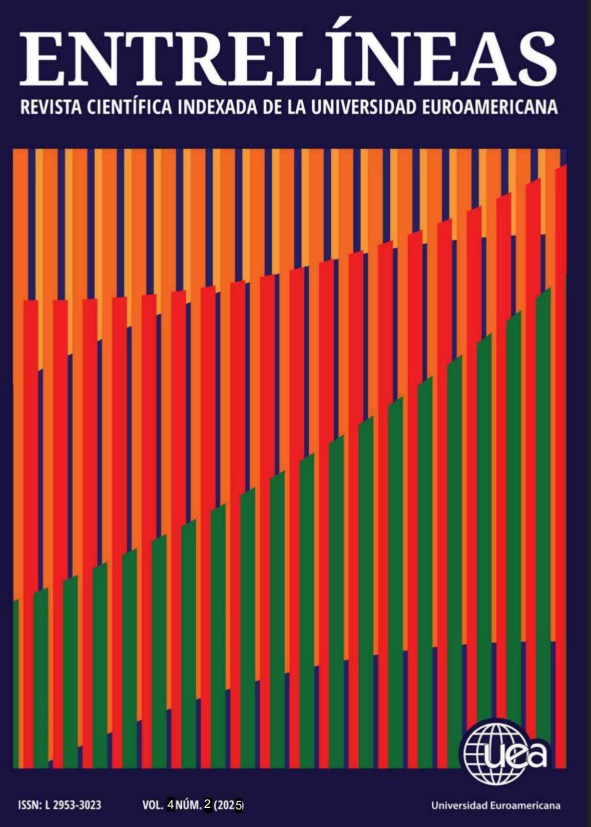Effectiveness of marketing strategies in consumer purchase decision-making
DOI:
https://doi.org/10.56368/Entrelineas424Keywords:
marketing strategies, purchasing decisions, consumer behavior, perceived value-marketing.Abstract
This study analyzes the effectiveness of marketing strategies in the purchasing decision-making of modern consumers, who are more informed and critical. The objective was to analyze how these strategies influence consumer behavior, transcending the traditional sales-centric perspective. Using a qualitative documentary review methodology, classic sources were examined and complemented with contemporary ones. The main result identified that optimal effectiveness is achieved by integrating rational and emotional dimensions, through strategies such as the creation of perceived value, personalization, omnichannel, and experiential marketing, where trust and authenticity are paramount. The most important conclusion is that success does not depend on isolated actions, but on a strategic articulation that combines the generation of valuable experiences, transparency, and social responsibility to build lasting loyalty and adapt to the expectations of today's consumers.
Downloads
References
Azabache Vásquez, S. C. & Martínez Núñez, C. G. (2024). Inspiración del consumidor, autocongruencia y valor percibido con relación a la intención de compra de las marcas de prestigio accesible. [Trabajo de Grado]. Universidad Peruana de Ciencias Aplicadas. https://repositorioacademico.upc.edu.pe/bitstream/handle/10757/683936/Azabache_VS.pdf?sequence=1&isAllowed=y
Ben Abdelmouamen, S. (2021). El marketing digital y su impacto en el comportamiento del consumidor. [Tesis de Grado]. Universidad de Valladolid. https://uvadoc.uva.es/bitstream/handle/10324/48690/TFG-N.%201658.pdf;
Bohórquez, M. (2024). Balancing emotional and rational approaches in marketing. In OneBite. https://www.onebite.co.uk/insights/balancing-emotional-and-rational-approaches-in-marketing/#:~:text=Rational%20marketing%20typically%20focuses%20on,turns%20them%20into%20real%20benefits.
Bonilla Lituma, S. A. (2024). Branding emocional: la influencia de las estrategias en la percepción y fidelización de las consumidoras de la marca de Litargmode. [Tesis de Licenciatura]. Universidad del Azuay.
Calatayud García, M. (2024). Técnicas aplicadas al análisis del comportamiento del consumidor. [Tesis de Grado]. Universidad de Valladolid. https://uvadoc.uva.es/bitstream/handle/10324/70995/TFG-J-611.pdf?sequence=1&isAllowed=y
Carvajal, L., Hernández, A., Rodríguez, J. & Castillo, D. (2024). La omnicanalidad como estrategia de permanencia y crecimiento. [Seminario de Investigación de Especialización]. Universidad Ean. https://repository.universidadean.edu.co/server/api/core/bitstreams/137b2942-42b1-4d60-abf8-5223f4838f86/content
Costa Reis, E., de Oliveira Lima-Filho, D., & Quevedo-Silva, F. (2017). Una perspectiva sobre las dimensiones hedónica y funcional de la alimentación. Revista Brasileira de Marketing, 16(1), 28-40. https://www.redalyc.org/pdf/4717/471755319004.pdf DOI: https://doi.org/10.5585/remark.v16i1.3523
de Esteban, F. (2015). El futuro del marketing está en la personalización. En Deloitte. https://www.deloitte.com/es/es/Industries/consumer/perspectives/El-futuro-del-marketing-esta-en-la-personalizacion.html
de León Long, A. I. & Martínez, V. M. (2025). La huella del marketing ecológico en la responsabilidad social empresarial de las organizaciones. Experior, 4(2), 152-164. https://doi.org/10.56880/experior42.4 DOI: https://doi.org/10.56880/experior42.4
Díaz, M. (2025). Inclusión sensorial en campañas de marketing para personas con discapacidad desde el neuromarketing inclusivo. Experior, 4(2), 165-179. https://doi.org/10.56880/experior42.5 DOI: https://doi.org/10.56880/experior42.5
Fournier, S. (1998). Consumers and Their Brands: Developing Relationship Theory in Consumer Research. Journal of Consumer Research, 24, 343-373. https://www.researchgate.net/publication/24098988_Consumers_and_Their_Brands_Developing_Relationship_Theory_in_Consumer_Research DOI: https://doi.org/10.1086/209515
García Domínguez, D. (2024). Medición de la fidelización de clientes en la era digital. Serie Científica de la Universidad de las Ciencias Informáticas, 17(7), 57-70. http://scielo.sld.cu/scielo.php?pid=S2306-24952024000700057&script=sci_abstract
González Hernández, E. M., Orozco Gómez, M. M., & Barrios, A. de la P. (2011). El valor de la marca desde la perspectiva del consumidor. Estudio empírico sobre preferencia, lealtad y experiencia de marca en procesos de alto y bajo involucramiento de compra. Contaduría y Administración, (235), 217-239. https://www.scielo.org.mx/pdf/cya/n235/n235a11.pdf DOI: https://doi.org/10.22201/fca.24488410e.2011.417
Hoyer, W. D., MacInnis, D. J. & Pieters, R. (2018). Comportamiento del consumidor. Cengage.
Jiménez Flores, V. J., Jiménez Flores, O. J., Jiménez Castilla, J. U. & Jiménez Flores, J. C. (2025). Mejorando la lealtad del cliente en multinacionales: el papel del valor percibido y la calidad del servicio. Revista InveCom, 5(4), e504056. https://doi.org/10.5281/zenodo.14827892
Kotler, P. & Armstrong, G. (2012). Marketing. Pearson Educación.
Kotler, P. & Keller, K. K. (2006). Dirección de marketing. Pearson Educación.
Kotler, P., Kartajaya, H., & Setiawan, I. (2024). Marketing 6.0: el futuro es inmersivo. Lid Editorial.
Lambin, J. J., Chumpitaz, R., & Schuiling, I. (2012). Market-driven management: Strategic and operational marketing. Macmillan International Higher Education. DOI: https://doi.org/10.1007/978-0-230-36312-0_21
López Macías, L. E. (2025). Estrategias digitales para la mejora de la experiencia del cliente y su fidelización en plataformas de comercio electrónico. Instituto O’Higgins, 1-12.
Mariñas González, G. (2025). El cambio permanente: management efectivo para tiempos de incertidumbre. ESIC Editorial.
Morales, D. V. (2014). Innovación y marketing de servicios en la era digital. Esic Editorial. DOI: https://doi.org/10.15658/CESMAG14.05050102
Moreano Guerra, C. B., Escobar Erazo, T. E., Haro Haro, E. R. & Villagómez Valencia, P. A. (2024). Redes Sociales y su Impacto en el Entorno Digital de las Empresas. Ciencia Latina: Revista Multidisciplinar, 8(2), 831-857. https://doi.org/10.37811/cl_rcm.v8i2.10531 DOI: https://doi.org/10.37811/cl_rcm.v8i2.10531
Páramo Morales, D. P. (2024). Investigación científica en marketing. Revista científica Pensamiento y Gestión, (56), vii-xviii. https://dx.doi.org/10.14482/pege.56.861.721 DOI: https://doi.org/10.14482/pege.56.861.721
Paz Salas, D. I., Cedeño Moncayo, L. & Franco Anchundia, F. (2024). Transformación del marketing digital y comportamiento del consumidor. Revista Científica Consultina, 2(1), 55-66. https://doi.org/10.63406/r.c.c..v2n1.2024.24 DOI: https://doi.org/10.63406/r.c.c..v2n1.2024.24
Pine, B. J. &. Gilmore, J. H. (2000). La economía de la experiencia. El trabajo es teatro y cada empresa es un escenario. Granica.
Prahalad, C.K. & Ramaswamy, V. (2004). Co-creation experiences: The next practice in value creation. Journal of Interactive Marketing, 18(3), 5–14. doi: 10.1002/dir.20015. https://www.researchgate.net/publication/227604879_Co-Creation_Experiences_The_Next_Practice_in_Value_Creation DOI: https://doi.org/10.1002/dir.20015
Schiffman, L. & Kanuk, L. (2010). Comportamiento del consumidor. Pearson Educación.
Sheth, J. N., Sethia, N. & Srinivas, S. (2011). Mindful Consumption: A Customer-Centric Approach to Sustainability. Mindful Consumption: A Customer-Centric Approach to Sustainability. Journal of the Academy of Marketing Science, 39(1),21-39. http://dx.doi.org/10.1007/s11747-010-0216-3 DOI: https://doi.org/10.1007/s11747-010-0216-3
Solomon, M. R. (2008). Comportamiento del consumidor. Pearson Educación.
Universidad de Nebrija. (2022). El 90 % de las decisiones de compra de los consumidores son emocionales. En Actualidad Nebrija. https://www.nebrija.com/medios/actualidadnebrija/2022/04/28/decisiones-compra-consumidores-son-emocionales/#:~:text=El%2090%20%25%20de%20las%20decisiones%20de%20compra%20de%20los%20consumidores%20son%20emocionales,-Publicado:%2028%20abril&text=M%C3%A1s%20del%2090%20%25%20de%20las,Conversaciones%20con%20David%20Torrej%C3%B3n.
Useche Moreno, E. A., & Rendón Bello, S. V. (2024). La personalización de contenidos para audiencias masivas por medio de la generación automatizada con ChatGPT (GPT-4). Universidad El Bosque. 1-17. https://repositorio.unbosque.edu.co/server/api/core/bitstreams/abba806a-09c2-4188-a442-bdd959fb489e/content
Zambrano Barros, N. A., Maldonado Castro, J., Maldonado Castro, Ángel B., & Espinoza Laaz, H. L. (2024). El marketing de influencers: cómo la credibilidad y el valor del mensaje impactan en la confianza del consumidor. Religación, 9(43), e2401349. https://doi.org/10.46652/rgn.v9i43.1349 DOI: https://doi.org/10.46652/rgn.v9i43.1349
Zeithaml, V. A. (1988). Consumer Perceptions of Price, Quality, and Value: A Means-End Model and Synthesis of Evidence. Journal of Marketing, 52(3), 2-22. https://doi.org/10.1177/002224298805200302 DOI: https://doi.org/10.1177/002224298805200302
Downloads
Published
Issue
Section
License

This work is licensed under a Creative Commons Attribution-NonCommercial 4.0 International License.
You are free to:
- Share — copy and redistribute the material in any medium or format
- Adapt — remix, transform, and build upon the material
- The licensor cannot revoke these freedoms as long as you follow the license terms.
Under the following terms:
- Attribution — You must give appropriate credit , provide a link to the license, and indicate if changes were made . You may do so in any reasonable manner, but not in any way that suggests the licensor endorses you or your use.
- NonCommercial — You may not use the material for commercial purposes .
- No additional restrictions — You may not apply legal terms or technological measures that legally restrict others from doing anything the license permits.










